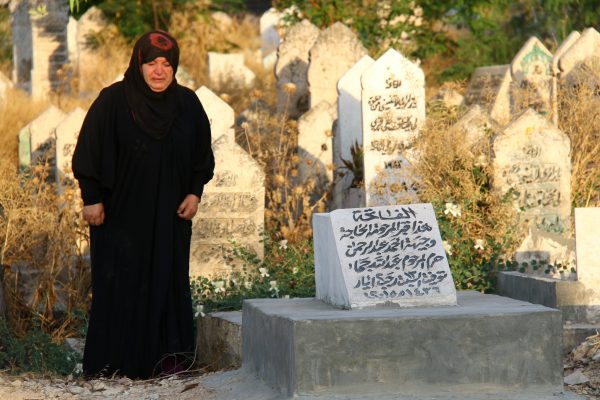Lost In Grief

A mother visiting the grave of her son who was killed in an air raid in 2015. Photo by: Mujahid Abu al-Jud
"Another family is torn apart by conflict."
Maha, a 29-year-old woman from Kafr Nabl, lost her father when she was just 14 years old.
She was the eldest child, with a younger sister and three little brothers. Their widowed mother became the family’s sole breadwinner.
Maha said that her mother tried so hard to compensate, she became both mother and a father to them.
Two years later, Maha received a proposal of marriage from a young man from the city. Because of the family’s lack of security and poor financial situation, her mother agreed that she could marry, although she was still only 16.
Mohamed, two years younger than Maha, tried to find work at his uncle’s shop to help his mother support the family. But his mother refused to let him because she was afraid that working would affect his studies. She had always dreamed that he would go to college and get a good job.
Years went by and the Syrian revolution broke out. Mohammed had by then realised his mother’s dream to enter college but abandoned his studies to joined the ranks of the revolutionaries with a number of his friends. Together, they went out on the streets to march in peaceful demonstrations against the regime.
Eventually the army entered and occupied the city of Kafr Nabl and surrounded it with checkpoints so as to cut it off from the rest of the country.
Maha was always proud of her mother, who, despite their difficult financial condition, turned her house into a warm home for the rebels. She used to cook for them, welcome them, love them and encourage them to continue the revolution, as if she was the mother of all of them.
“We will live and the day when the revolution wins and Bashar al-Assad falls will come,” Maha’s mother used to say all the time.
A year after the revolution began, the city of Kafr Nabl was liberated and the regime army left. Maha’s mother was one of the happiest people alive. But she didn’t realise that the regime would not leave the city so easily. Their planes began bombing Kafr Nabel, in revenge for the soldiers who had been killed there.
Ten days after the liberation of Kafr Nabl in August 2012, Maha’s mother asked her son to take her to her father’s house near a former regime checkpoint to help him gather his possessions which had been scattered when his home was hit in an air raid.
After they had finished and were on their way back home, a regime aircraft fired four missiles at them.
Maha said, weeping bitterly,”This raid can’t be erased from my memory, this raid killed my mother, brother and a large number of innocent people.”
“As a result of this bombing, I lost my house, which was home to my husband, my children and I. And because my young brother and sister were left without a breadwinner, my family and I lived with them.”
She added, “My second brother was a soldier in the regime army, he tried several times to run away but he didn’t get the right opportunity. He was able to escape before the death of my mother and my brother but he and his friends lost their way so were arrested and jailed.”
Maha added with a sigh, “My mother died before she learned the fate of my second brother. Her only wish was to see him again before she died, but it was not God’s will.”
“I spent so long lost in grief and agony remembering my mother who raised us after the death of my father and went through the worst to make us happy. I also think of my brother who left school to help my mother and my other brother who remained imprisoned by the regime.”
A year after Maha’s mother died, her brother was released from the regime prison and arrived safely back home. His arrival was a ray of light for Maha and her younger siblings. But he was shocked to find that his mother and older brother had been killed.
